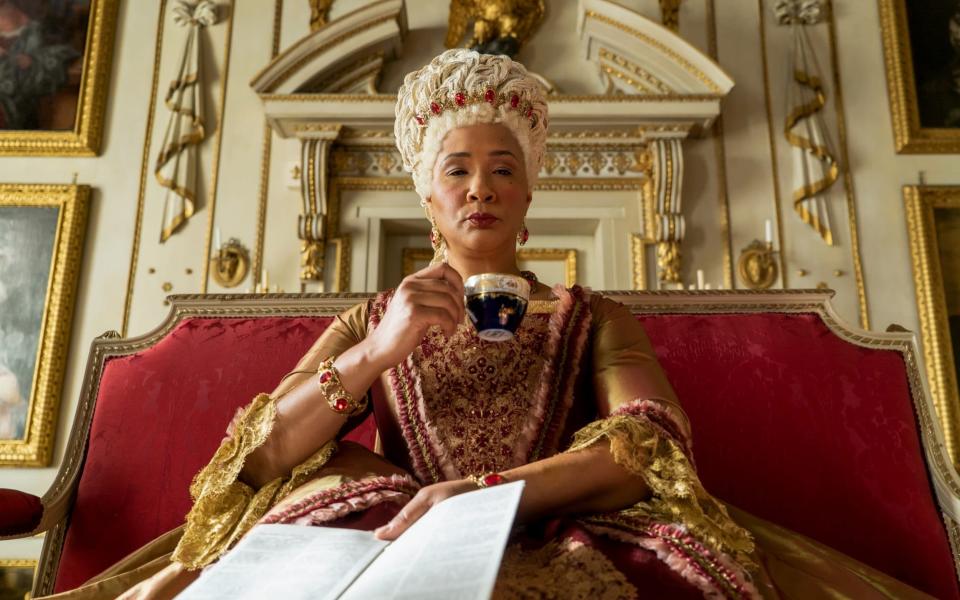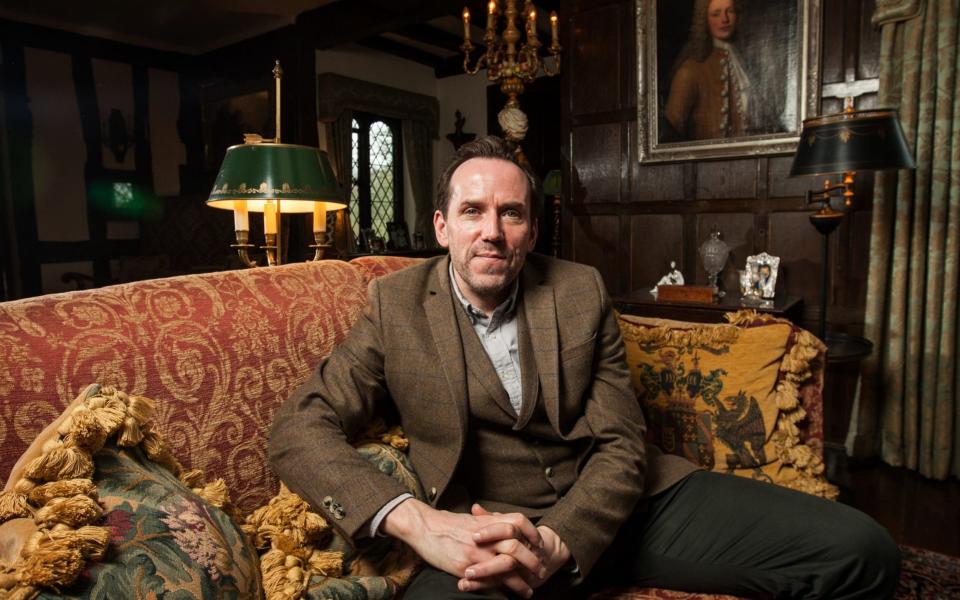Bridgerton’s Ben Miller: ‘TV shows shouldn't get cancelled by the culture wars’

Ben Miller admits he has grown a little frustrated with the TV culture wars. The actor and comedian, who rose to prominence as one half of the Armstrong and Miller duo before starring in Death in Paradise and Johnny English, has largely kept out of the arguments over race that have swept British television this year in the aftermath of the Black Lives Matter movement, killing off entire comedies like Little Britain and even resulting in one famous episode of Fawlty Towers being pulled from the BBC-owned streaming service, UKTV (it was later put back).
“I don’t think shows should be cancelled, I think there’s room for us to watch shows that were made in the past,” Miller, 54, tells me over the phone one December morning. He sounds upbeat but a little tired, having just finished filming for his upcoming ITV crime drama, Professor T (all cast were put in a bubble and tested twice a week for Covid-19). “For me it’s about the context in which something is shown. That makes all the difference. I’m a passionate believer in free speech. I think one of the dangers of the culture wars is that we stop listening to each other.”
He is speaking to promote his role as the patriarch of the Featherington family in Netflix’s new ratings juggernaut, Bridgerton – a glossy Regency costume drama that, as luck would have it, has become the latest skirmish in the ongoing conversation about race and representation.
In the series, Queen Charlotte is played by black actress Golda Rosheuvel (Silent Witness, Lady Macbeth). It was not a case of race-blind casting, says Miller, but a conscious decision from Shondaland productions to reflect the queen’s mixed ethnic heritage (some historians believe the real Charlotte was descended directly from a black branch of the Portugese royal family, tracing back to 13th Century ruler Alfonso III and his lover Madragana, who was a Moor).
Producers then took an imaginative leap by depicting a universe in which a black Queen Charlotte had decided to ennoble other non-white men and women into her royal court, creating the most racially diverse period drama ever.

It has already sparked discussion – some of it from historians concerned that Netflix is playing fast and loose with the truth (coming just a month after the controversial fourth series of The Crown), and some of it from out-and-out racists on social media.
Does Miller worry the hoo-ha could prove a distraction? “Bridgerton is so infectiously entertaining that everybody will enjoy it for that. I think audiences crave diversity. At the beginning [of filming] I went to the National Portrait Gallery, where you can look up portraits by year. So I looked up 1813, and it was an extraordinarily diverse society. Of course it was, because there was all kinds of international trade going on, some of it now very questionable. There was an enormous amount of cross-pollination across the globe, and London was a very diverse society. Why is that never shown in your typical Jane Austen costume drama?”
Under this new regime, I wonder aloud, would The Armstrong and Miller Show, the Nineties BBC sketch comedy that elevated Miller to fame alongside co-star Alexander Armstrong even get commissioned? It was made by two straight, white, male Cambridge graduates, after all. “Yes I think it could be. There's room for everything – there’s room for white, male, middle-class sketch comedians, but the point is we shouldn't only have white, male, middle-class sketch comedians.”

Inspired by Julia Quinn’s bestselling novels, and filmed last year mostly in Bath, Bridgerton follows a family of eight children, each trying to find a mate amid the debauchery of Regency London – essentially Jane Austen but with a great deal more nudity (a surprisingly accurate take on Georgian high society, historians say, which was known for its rampant promiscuity).
“It’s escapism really,” says Miller. “Aesthetically, it’s a beautiful period, kind of peak UK. If you’re doing a costume drama, you’re going to choose a period where everybody wore the most extraordinary clothes. The fashions for men are just fantastic, incredibly flattering. You put on a two-button suit after you’ve been doing Bridgerton for eight months and you feel like you’re wearing a flannel. The way you hold yourself, the way you walk and behave when you’re dressed like this is just really different.”
Bridgerton also looks at Georgian society through what critics have called a “feminist lens”. Miller says: “They talk about the ‘male gaze’, don't they, and this is definitely the female gaze. I couldn’t help noticing that my male co-stars were beyond beautiful. I would turn up every day and it’s like 100 of the most beautiful people you’ve ever seen in your life. To stand in a room as a middle-aged man next to Jonathan Bailey [Broadchurch, W1A]… it’s made for the female gaze, and the females are going to have plenty to gaze at.”
I ask whether, in its attempt to redress historical wrongs, Bridgerton is at risk of treating men the way female actors have for too long been treated (heart-throb Bailey is shown naked three times in the first episode alone, I point out). “I think there's a conscious attempt to treat men and women equally. I don't think you could get away with the opposite, if all the women kept their clothes on and the men took theirs off.”
The series is pushed as the perfect antidote to the fear and isolation of pandemic life – feelings Miller understands as well as the rest of us. In March, he was on what was supposed to be a 10-day holiday in Morocco with his wife (producer Jessica Parker) and their two children (Harrison, eight; and Lana, four) when the Moroccan government suddenly imposed a lockdown. They were stuck for four months; as the only person allowed to leave his house, Miller was forced to navigate police checkpoints on his way to buy food. Locals assumed all Europeans had the virus, and children chased him in the street shouting, “Coronavirus, coronavirus”.
But homeschooling proved an even bigger challenge. “It was horrendous. My wife and I had a military timetable. We tend not to use screens, and suddenly you’re saying, ‘Sit by your screen – this thing we’ve told you will rot your brain – and pay attention for eight hours a day’.”
Lockdown also scuppered his biennial turn to spend Christmas with Jackson, his son from his first marriage to actress Belinda Stewart-Wilson, best known as “Will’s fit mum” from The Inbetweeners. “It's very hard, but I'm just one of those people who can't dwell on things like that. It’s just not productive for me to go there. You have to think about what's positive, and the really positive thing is that, in unheard of time scales, we’ve produced not one but at least four vaccines which are capable of getting us out of this situation.”
Indeed, Miller, who in his 20s abandoned a Cambridge PhD in solid state physics for a part in a play, has spent a great deal of time this year thinking about the potential for science to rescue the world from the jaws of crisis. “At the time I was studying science the really exciting area was quantum physics, particle physics, but... what's really exciting at the moment is biology. If I was doing science again I would have probably been a biologist, which was the least interesting science when I was a schoolboy. It’s incredible what they [the Covid-19 vaccine teams] have done, and so quickly. Now we just need to organise, vaccinate people, and put this whole thing behind us.”
And until then, perhaps, we can distract ourselves with Bridgerton, and some good, old-fashioned Regency lovemaking.

